Chances are, you already understand the significance of keeping the asphalt on your property well-maintained. When you maintain your asphalt, it enhances curb appeal, promotes safety, and can even save you money on property upkeep over time.
At General Pavement Management we like to emphasize that sealcoating is the foundation of proper pavement maintenance!
In this article, we will explain the basics of sealcoating, its advantages, and how it’s done.
Let’s dive in!
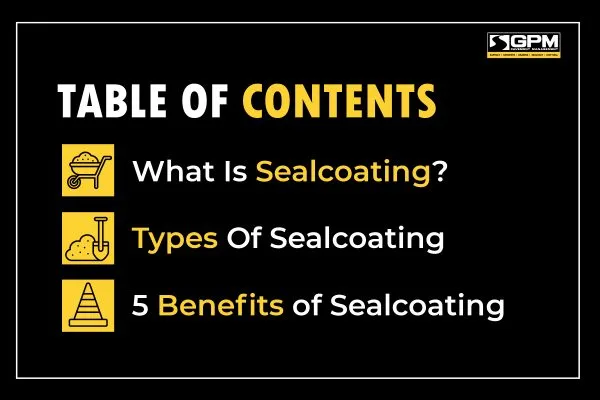
What is sealcoating and how does it impact pavement?
Pavement is typically composed of a coarse material like crushed stone or gravel mixed with a binding agent that holds everything together. (Fun fact: This binding agent is referred to as “asphalt,” even though we often use the term to describe the entire pavement.) The asphalt binding agent plays a critical role in keeping the pavement robust, making its maintenance essential.
Over time, water, UV rays, and chemicals from vehicles begin to break down the binding agent, causing the asphalt to weaken. As it becomes brittle and starts to crack, potholes and other problems can arise. To avoid your asphalt from falling apart, it’s necessary to maintain the binding agent that holds everything together.
A sealcoat is a protective layer that you can apply to the surface of your pavement to safeguard the asphalt binding agent from elements like water, chemicals, and UV rays. The sealcoat helps prevent your pavement from cracking and splitting, provides a slip-resistant surface, and gives a dark and attractive top layer to your asphalt paving.
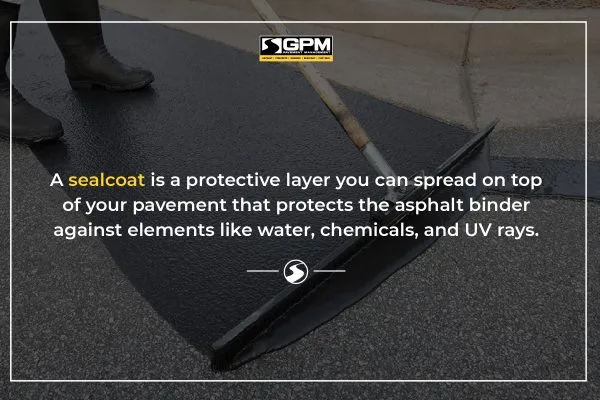
What is sealcoating made of?
There are different types of sealcoating, such as slurry seal, oil-based, water-based, and acrylic-based, which we’ll discuss in more detail later in this article. However, most sealcoating contains the same primary ingredients as asphalt.
Typically, sealcoating comprises a blend of a liquid asphalt binder such as bitumen or coal tar, sand, and other fine particles. Some sealcoats may also include UV protection and anti-oxidation agents.
It offers protection in several ways:
- It shields the pavement from damaging UV rays.
- It shields the pavement from harmful chemicals from vehicles.
- It prevents water from worsening fissures.
- It helps the pavement maintain its flexibility.
How often should you sealcoat your parking lot?
In moderate climates like California, it’s best to wait for 1-2 years before applying sealcoat to fresh pavement. Fresh pavement is still soft and uncured, so it’s crucial to let it dry before sealing it. Following that, it’s recommended that you sealcoat your driveway, parking lot, or private road every 3-5 years.
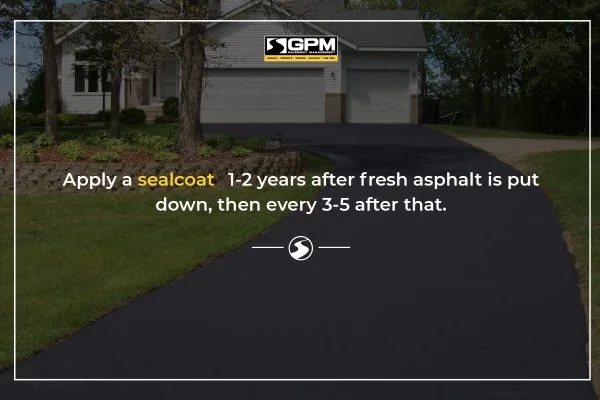
How do you apply sealcoating?
It’s essential that the pavement is clean and dry before applying sealcoating. The application can be done using a small handheld sprayer, a larger commercial sprayer, or by hand with a brush and squeegee.
Although it’s possible to apply sealcoating manually, it’s best to hire a professional if you want to avoid all the hard work.
Types Of Sealcoating
Several types of blacktop sealcoating are available.
Some options are:
Slurry seal
Slurry seal is a simplified version of pavement made of asphalt emulsion, additives, water, and coarser additives than regular sealcoat. It costs more than regular sealcoat and adds a thicker, rougher layer of protection, similar to a thin layer of pavement.
Acrylic seal
Acrylic seal is the most expensive type of pavement sealer, and it’s acrylic-based. It has numerous benefits, including UV and weather resistance, and it’s considered environmentally friendly compared to some types of blacktop sealcoating. It’s available in different colors, which can be useful for spaces such as tennis courts or airports.
Water-based seal
Water-based sealers are made of either coal-tar emulsions or asphalt emulsions. An emulsion is when one liquid is suspended in another without mixing the two together. In this case, asphalt emulsion is asphalt suspended in water. Water-based blacktop sealcoating forms a protective layer on top of the pavement and is more environmentally friendly than some types of sealer.
However, water-based sealers don’t penetrate the pavement as deeply as oil-based sealers and may require more frequent reapplications.
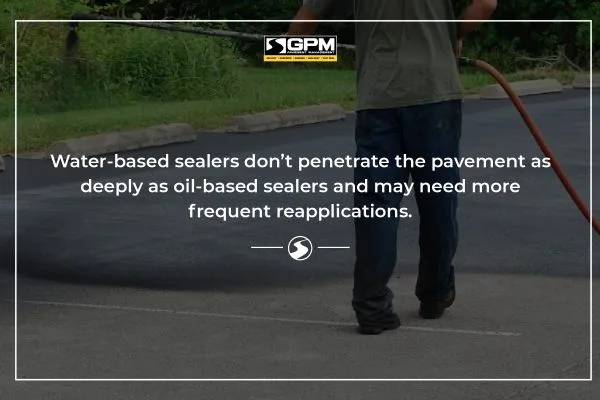
5 Benefits Of Sealcoating
Are you still wondering if sealcoating your driveway or parking lot is worth your time and money? Here are five benefits that might help you make a decision:
Lengthens the life of your asphalt
A sealcoat protects your pavement by preventing water from entering fissures, blocking UV rays that cause oxidation and deterioration, and protecting the asphalt from chemicals like oil and gas from cars. By doing so, it helps lengthen your pavement’s life, so you don’t have to replace it as often. In fact, if you seal your pavement every three years, you can extend its life by up to 10 years!
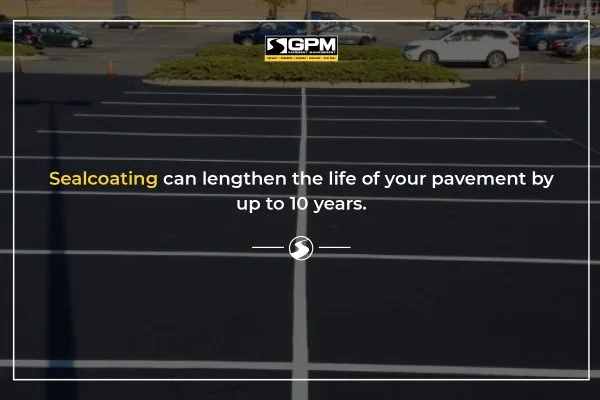
Provides a slip free surface
A smooth, slip-resistant surface is essential for the safety of drivers, pedestrians, and cyclists. Sealcoating provides a textured surface that improves traction, preventing slips and falls, and reducing the risk of accidents.
Improves aesthetics
Sealcoating gives your pavement a fresh, dark appearance that improves its overall curb appeal. The uniform black surface looks smooth and clean, making your property look well-maintained.
Makes for easy cleanup
Old, cracked pavement is difficult to keep clean, but not sealcoated pavement! Smooth, uncracked pavement is a huge benefit, especially if you use your pavement as a space to work on jobs that leave a lot of debris. Cleanup is a lot easier for you if your pavement has a smooth surface.
Saves you money
Sealcoating is a cost-effective way to protect your pavement, especially compared to the cost of replacing the entire surface. Investing in sealcoating every few years can help extend the life of your pavement and save you money in the long run, potentially thousands of dollars!
Protecting your pavement against the elements, and preventing water from seeping into cracks and fissures reduces the likelihood of potholes and other types of pavement damage, saving you money on costly repairs.
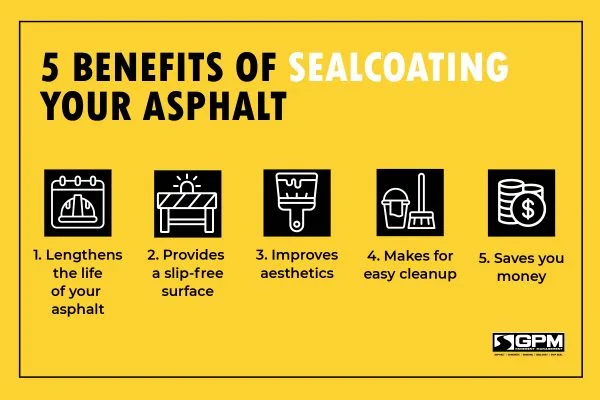
Conclusion
Sealcoating your pavement is a worthwhile investment that can benefit you in several ways. Consider hiring a professional to apply sealcoating to your property and enjoy the benefits of a well-maintained pavement.
If you’re a business owner or property manager in need of sealcoating services for your parking lot, lane, or road, contact us at General Pavement Management. Our services include everything necessary to maintain your concrete or asphalt paving.
Don’t hesitate to give us a call today!
